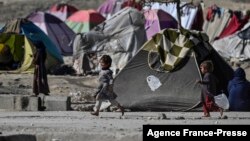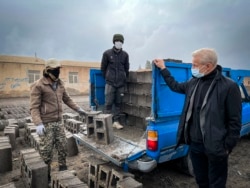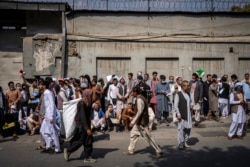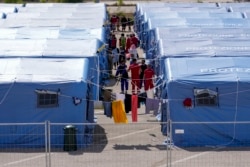Frustration was etched in his voice.
Jan Egeland, secretary general of the humanitarian organization Norwegian Refugee Council (NRC), had just returned from a visit to Iran’s southeast border and described the international response to the deepening humanitarian crisis in Afghanistan as “pitiful,” during a phone interview with VOA.
Some 5,000 Afghan migrants are entering Iran every day, Egeland said, and he fears the numbers of Afghans fleeing to neighboring countries, mainly Iran and Pakistan, will rise exponentially as winter sets in.
Concluding a fact finding mission to Iran, Egeland said he had visited a border region in southeast Iran and heard about a “steady stream of new arrivals.”
“We have these figures now and we can confirm that four to 5,000 cross the border daily, more than 300,000 since the Taliban takeover,” he told VOA.
“We’ve heard heart-breaking stories from families that have recently arrived in Iran,” said NRC’s secretary general. “One refugee said they were targeted for being Shia Muslim, their few remaining possessions were taken, their house burned, and they had to flee multiple times within Afghanistan before reaching Iran. They were told that their daughters would be married off to fighters as soon as they reach the age of 10.”
Most of the Afghans crossing into Iran are doing so illegally. Iran has officially closed the border and the new arrivals are joining around 3.6 million Afghans already in the country, who have been fleeing war-wracked Afghanistan for decades. Of these only 780,000 are recognized formally by Iran as refugees.
The Norwegian Refugee Council, other major Western NGOs and U.N. agencies have been urging the Iranian government to formally open the border to ease the plight of Afghans trying to cross.
Egeland was speaking to VOA a day after Italy accused fellow European Union member states of responding weakly to the growing humanitarian crisis in Afghanistan since the Taliban seized power.
The Italian government signed a protocol Monday with a group of NGOs to allow some 1,200 Afghan refugees, coming from Pakistan, Iran and other countries where they have been provided with initial asylum, to reach Italy via humanitarian corridors.
Interior Minister Luciana Lamorgese told reporters in Rome “not all European countries have the same propensity to welcome, to respect human rights.”
While welcoming the Italian action, Egeland said much more needs to be done by the international community than just setting up a handful of legal pathways for a few thousand migrants fleeing Afghanistan, where the economy is in free fall.
“The international response to the suffering, immense suffering in Afghanistan and for Afghans and neighboring countries is really pitiful,” he said. “There must be an immediate scale up of aid both inside Afghanistan and in neighboring countries like Iran, before the deadly winter cold.”
Iran and Pakistan host around 90 percent of all the Afghans who have fled their country in the past four decades, the U.N. refugee agency estimates. They cannot cope with the numbers of refugees, said Egeland, who points out that Iran has more Afghan refugees within its borders than all European countries combined.
Last month, heads of government and foreign ministers from the world’s 20 leading economies — the G-20 — agreed at a video summit to examine how to inject more aid into Afghanistan, while preventing funds being controlled by the Taliban and used for political purposes rather than humanitarian. The European Union announced during the summit a $1.15 billion aid package for Afghanistan “to avert a major humanitarian and socio-economic collapse.”
The pledge came after a plea from U.N. Secretary-General Antonio Guterres.
“If we do not act and help Afghans weather this storm, and do it soon, not only they but all the world will pay a heavy price,” he told global leaders. The meeting marked the first time the world’s richest nations had met to discuss the consequences of the U.S. withdrawal from Afghanistan since the Taliban takeover in August.
Egeland says a heavy price is already being paid by Afghans. He said the EU made a “great pledge” but he has seen little money flowing through. He dismisses the political worries expressed by some Western powers about the danger of international aid sent to Afghanistan being manipulated by the Taliban, or of the Iranians misusing any aid they might receive. He said the scale of the humanitarian crisis outweighs political concerns and what aid is trickling through does not go to the Taliban, or the Iranian or Pakistani governments.
“The aid is going through international organizations to the same civilians that the Western countries left behind,” he said.
The Norwegian Refugee Council head notes the irony about concerns being expressed over the plight of Afghan girls being blocked by the Taliban from going to school.
“We're working to get education for all the girls in Afghanistan,” Egeland said. “But it would be the ultimate insult if these girls died while we are discussing their right to secondary education.”
The latest U.N. figures suggest that more than half-a-million Afghans have been displaced by fighting in Afghanistan this year alone; almost 17 million are facing crisis levels of food insecurity; and nearly half of all children under five are malnourished as a consequence of conflict, drought and the coronavirus pandemic, U.N. agencies say.
“I'm trying to convey again and again, we don't have much time. We don't have months. We don't even have weeks,” he said.







